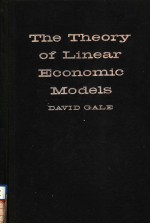图书介绍
THE THEORY OF LINEAR ECONOMIC MODELSpdf电子书版本下载

- DAVID GALE 著
- 出版社: INC.
- ISBN:
- 出版时间:未知
- 标注页数:330页
- 文件大小:12MB
- 文件页数:351页
- 主题词:
PDF下载
下载说明
THE THEORY OF LINEAR ECONOMIC MODELSPDF格式电子书版下载
下载的文件为RAR压缩包。需要使用解压软件进行解压得到PDF格式图书。建议使用BT下载工具Free Download Manager进行下载,简称FDM(免费,没有广告,支持多平台)。本站资源全部打包为BT种子。所以需要使用专业的BT下载软件进行下载。如 BitComet qBittorrent uTorrent等BT下载工具。迅雷目前由于本站不是热门资源。不推荐使用!后期资源热门了。安装了迅雷也可以迅雷进行下载!
(文件页数 要大于 标注页数,上中下等多册电子书除外)
注意:本站所有压缩包均有解压码: 点击下载压缩包解压工具
图书目录
Chapter 1.Linear Programming: Examples, Definitions, and State——ments of the Principal Theorems 1
1.Examples 1
The diet problem 1
The transportation problem 4
Production to meet given demand at minimum cost 6
Production to maximize income from given resources 7
2.Duality and prices 8
3.Further interpretation of duality 13
4.Price equilibrium 19
Bibliographical notes 23
Exercises 23
Chapter 2.Real Linear Algebra 28
1.Vectors 30
2.Scalar product, matrices, linear equations 35
3.Real linear equations and inequalities 42
4.Basic solutions of equations 49
5.Geometry of linear inequalities Convex cones 51
6.Extreme vectors and extreme solutions 60
7.Convex sets and polytopes 66
Bibliographical notes 69
Exercises 69
Chapter 3.The Theory of Linear Programming 74
1.Definitions 75
2.The duality theorems 78
3.The equilibrium theorems 82
4.Basiosolutions 84
5.An application: allocation of resources in a competitive economy 85
Bibliographical notes 93
Exercises 93
Chapter 4.Computation.The Simplex Method 97
1.Solving simultaneous equations and inverting a matrix 98
2.The simplex method for linear programming.Discussion 105
3.Theory of the simplex method 108
4.Some numerical examples 113
5.Nonnegative solutions of linear equations 119
6.Solving linear inequalities 121
7.Degeneracy.The generalized simplex method 123
Bibliographical notes 128
Exercises 129
Chapter 5.Integral Linear Programming 132
1.Examples 132
Transportation problem with indivisible commodity 132
The optimal-assignment problem 133
The loading problem 134
2.Flows in networks 134
3.The simple-assignment problem 143
4.The transshipment problem 148
5.The optimal-assignment problem 155
6.A problem related to optimal assignment Price equilibrium 160
7.The transportation problem 162
8.Other examples: shortest route;the caterer 170
9.Concluding remarks and open questions 172
Bibliographical notes 174
Exercises 174
Chapter 6.Tuo-person Games: Examples, Definitions, and Ele-mentary Theory 180
1.First examples and definitions 182
Odds and evens(matching pennies) 182
Morra 183
2.Further examples of matrix games 184
Goofspiel 184
Bluffing 186
A,B,C 187
3.Solutions of games.Mixed strategies 189
4.Value of a game and optimal strategies 193
5.Some infinite games 196
Continuous bluffing 196
Duels 198
The oil prospector (a game against nature) 199
The bomber and the submarine 201
High number 201
Low number 202
6.Saddle points and minimax 202
7.Symmetric games 204
8.Proof of the fundamental theorem 207
Appendix to Chapter 6: A geometric “proof” of the fundamental theorem of game theory 208
Bibliographical notes 211
Exercises 212
Chapter 7.Solutions of Matrix Games 216
1.Relation between matrix games and linear programming 216
2.Solving games by the simplex method 220
3.Optimal strategies 223
4.Solutions 227
5.Examples 231
6.The structure of symmetric games 233
7.Constructing a game with prescribed solution 235
8.Basic optimal strategies 241
9.A method of “learning” a game 246
10.Convergence of the learning method 250
Bibliographical notes 256
Exercises 256
Chapter 8.Linear Models of Exchange 260
1.Examples 260
The simple exchange model The price problem 260
The simple linear model of international trade 263
2.Equilibrium for the exchange model 264
3.Dynamics theory 271
4.Dynamics in the reducible case 278
5.Price equilibrium for linear exchange models 281
6.An example of price equilibrium 287
7.Uniqueness of equilibrium prices 289
Bibliographical notes 290
Exercises 290
Chapter 9.Linear Models of Production 294
1.The simple linear production model 294
2.A dynamic property of the simple model 299
3.The Leontief model 301
4.The general linear production model Efficient points 306
5.Von Neumann’s expanding model 310
6.Some examples 315
7.The expanding simple model 317
Bibliographical notes 318
Exercises 319
Bibliography 323
Index 327